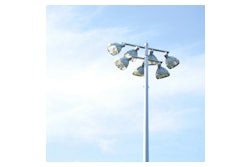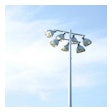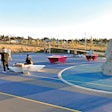Look beneath the surface when searching for a qualified builder of tennis courts or tracks.
A tennis court is not a parking lot. A running track is not a street. These statements should be so obvious as to not even warrant mention. But, evidently, they're not obvious to many people embarking on new facility construction. Too many instances occur of tracks and courts being built that don't meet the recommended specifications for their construction.
Why? To anyone unfamiliar with the nuances of court or track construction, they seem simple to build. However, these are surfaces designed for specific activities and for competition at specific levels, and are thus expected to conform to certain standards regarding size, slope, marking and equipment. A specialty contractor - a person with expertise in the construction of courts and tracks - will have the knowledge to make the process a success.
There's no magic formula for finding the right contractor. You must simply be diligent in your research, and ask the right questions. While what follows will apply to finding any type of contractor - you use the same basic method to hire a qualified tennis court contractor as you would to hire a contractor for your home - it is especially vital in a corner of the industry in which anyone owning paving equipment will claim to be qualified.
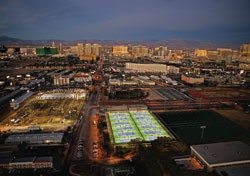 Fertita Tennis Complex at the University of Nevada-Las Vegas
Fertita Tennis Complex at the University of Nevada-Las Vegas1.) ASK AROUND. Colleagues who have built or renovated a tennis court could be your best source of information. Seek out someone who has a facility similar in scope to the one you are planning, and come prepared with a list of questions. Was your contact happy with the completed project? Did the contractor deliver the project on time and as promised? Were there any unforeseen delays, complications or hidden costs? Did the contractor return calls promptly? After the project was completed, was the contractor available to answer questions and attend to punch-list items? Would your contact recommend this contractor, based on his or her experience?
"Word of mouth seems to work well for gathering information regarding the specialty tennis construction industry," says Lee Murray of Competition Athletic Surfaces Inc. in Chattanooga, Tenn. "Coaches, athletic directors and facility managers all have professional peer groups they can tap for recommendations."
Many people are proud of their new facility, but perhaps not always 100 percent satisfied with the service they got after it was finished. Therefore, don't just ask the advice of owners or managers of new courts; approach people whose facility has been around for a few years. Find out whether they've stayed in touch with their contractor for seasonal maintenance, regular repairs or resurfacing. Has the contractor been responsive to their needs? Has the facility held up well? No facility stays new forever, but a good relationship with someone who provides quality workmanship will go a long way toward keeping a facility performing at its best for years to come.
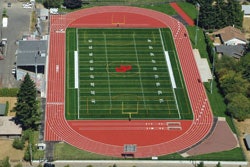 The track facility at David Douglas High School in Portland, Ore.
The track facility at David Douglas High School in Portland, Ore.2.) SHOP AROUND. While word of mouth is a great tool, there are other ways to find the right contractor. The American Sports Builders Association, the trade association for designers, builders and suppliers of materials and equipment to the sports facility construction industry, offers a directory of its membership free of charge, as well as a feature on its web site (www.sportsbuilders.org) allowing searches by geographical area, area of expertise and so on. ASBA also offers comprehensive certification programs for builders of both tennis courts and running tracks (see "Confidence Builder," below).
If using a local Yellow Pages directory or an online state or regional business directory, check under "tennis court construction" rather than a general term, such as "contractor." Only a small number of contractors will consider themselves specialists in athletic and recreational facilities. Trade industry magazines and web sites may also be helpful, since specialty contractors will be listed (and some will advertise) in them.
When interviewing prospective contractors, make sure to ask specific questions. How many years has the company been in business? If it is a relatively new company, what is the work experience of its principals? How many courts has the company built, and of what type (residential, institutional, indoor, outdoor)? Was it responsible for the complete facility, or only the site work or surface? Every question you ask brings you a step closer to finding the right partner for the job.
Art Tucker of Plexipave Sport Surfacing Systems in Andover, Mass., suggests going even deeper with your inquiries: "Are they bondable for larger projects? Are they an authorized applicator of the product designated? Do they offer an installer or manufacturer's warranty? Will they be installing to an industry spec?"
 The outdoor tennis facility at Samford University
The outdoor tennis facility at Samford University3.) CHECK IT OUT. Ask for references, both good and bad, says Randy Futty of Lee Tennis Court Products in Charlottesville, Va. "I often tell prospective buyers to not only check out the positive references of a builder, but ask the contractor to supply the names of customers where the job encountered trouble along the way," Futty says. "This lets the buyer know that the prospective contractor is both adaptable to changing conditions and transparent in his or her approach to business."
Make sure the references are recent, since companies and contacts can change. If the references are local to you, you can visit the facilities, rather than just look at photos. Ask contractors for help setting up a site visit during which you can observe the courts being played on and talk to on-site personnel.
Get references, also, from designers, subcontractors, bankers and bonding companies. Find out about the contractor's insurance coverage. Have there been any major accidents or claims against the company? See if the contractor has won awards or received special recognition for any recent work. Is the company certified or accredited by any trade organization? If the contractor has been or is currently involved in litigation, find out the details. Check with your local Better Business Bureau or licensing agency to see if any consumer complaints have been filed.
 The track facility at San Joaquin Delta College
The track facility at San Joaquin Delta College4.) MAKE SURE IT'S BUILT RIGHT. In order for sports facilities to be ready for competition at their appropriate level (high school, college, club, recreational), they need to be built in accordance with the specifications, rules and regulations set forth by the proper governing bodies. A tennis court, for example, needs to be a certain length and width, sloped and marked correctly, with the proper clearance around the sides and back of the court and, if appropriate, the lighting levels specified for competition. Make certain that any contractor is using the most up-to-date version of the construction guidelines set forth by the American Sports Builders Association, and that the rules of the appropriate governing body (NCAA for collegiate level competition, NFHS for high school) are satisfied.
5.) GET IT IN WRITING. Ask for proposals in writing, and take time to review them thoroughly. Ensure that the bids, including products to be used and methods of construction, are identical to your specifications. Look at what is and what is not included in the contract price. Make sure everyone agrees on who is responsible for permitting, site preparation, electrical power, taxes, insurance, removal of trees and shrubbery, restoration of the construction access route and so on.
Compare the job schedules of various bids. What are the timelines being promised? Look at wording regarding payment, and most important, about guarantees or warranties and their limits and expiration dates. Then compare all proposals. Get legal assistance to help define or clarify any terms you don't understand. Create a matrix to keep track of any differences between bids. Once you have settled on a contractor, get ready to confirm the agreement in writing.
 The tennis courts at Homewood (Ala.) Middle School
The tennis courts at Homewood (Ala.) Middle School6.) FOLLOW YOUR INSTINCTS. This no doubt sounds counterintuitive after all these specifics. Set aside your top choice for a minute and listen to your instincts. What are they telling you? Are you at ease with the contractor you're favoring, or do you have lingering doubts? If so, why? Ask yourself whether the person is prompt in returning calls, answering questions and helping you understand complex issues. Remember that communication will be essential to keeping the project moving.
Building a tennis court or running track requires a substantial financial investment. Make the smartest investment you can - that of your time. It'll pay dividends when you make your final decision.
Confidence Builder
Identifying the right contractor for a construction job is never easy, but one school district created a bidding requirement to help it do just that. Problem was, it needed the help of the legal system to enforce it.
In a 2008 decision, the Attorney General of Massachusetts upheld the Masconomet Regional School District in Topsfield, Mass., in imposing a requirement that bidders for a running track resurfacing project employ an individual who had earned the designation of Certified Track Builder from the American Sports Builders Association. It also required the winning bidder to be a member in good standing of the association.
The ASBA's certified builder program encompasses three designations - Certified Tennis Court Builder, Certified Track Builder and Certified Field Builder. To become a certified builder, an individual must demonstrate a set amount of construction expertise, and then pass a comprehensive exam on either tennis court or running track construction. In order to retain the designation, the individual must recertify every two years by providing documentation showing continued experience in the industry.
The low bidder on the Masconomet project was not awarded the job because the company did not have such an individual on staff; nor was it a member of the ASBA. The job was awarded to a company that did and was, and the losing company filed a protest. The bid requirements were upheld as an appropriate means to ensure construction in accordance with industry standards, and to achieve the objective of quality construction.
In defending its decision to require that the winning bidder employ a CTB, the school district argued that it had encountered serious problems regarding the workmanship in prior track installations, which justified the need for a quality standard. After review, the state Attorney General found that the district's decision was not arbitrary because the certification requirement "formed a rational basis for concluding that [the non-member company] was not a responsible bidder." It further found that the requirement is not overly restrictive because "certification is open to anyone who meets the ASBA's standards."














